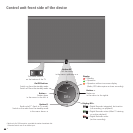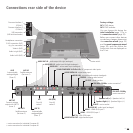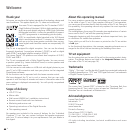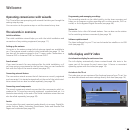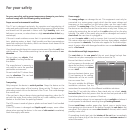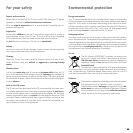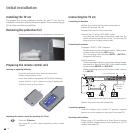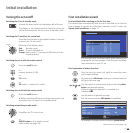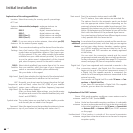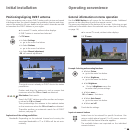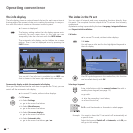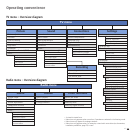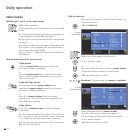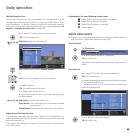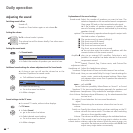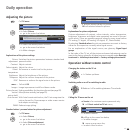
- 12
Start the automatic station search with OK.
First TV stations, then radio stations are searched for.
The stations found in the automatic search are divided
into the appropriate station blocks depending on the
previously selected antenna cables (signal sources). Sub
-
sequently the stations can only be re-sorted within these
blocks. At the beginning of the station list you will find the
block with the stations of the preferred signal source.
Any mixed sorting of stations from different signal sources
is only possible with the favourites list.
In conclusion the connection wizard and the sound com
-
ponents wizard will start; with their help you can register
and set your video devices, decoders, speaker system,
or a HiFi/AV amplifier and connect them to the TV set.
DVD players and DVD recorders are already registered
at the factory.
You can start the connection wizard and the sound
components wizard manually later and add new devices.
Further information is available from page 35 (Connection
wizard) and page 39 (Sound components wizard).
If you have registered and connected a recorder in the
connection wizard, the Digital Link Plus transmission
begins at the end of the sound components wizard. If
a Digital Link Plus capable recorder is connected, the
station list of the analogue stations is transmitted to the
external recorder.
You can also call Digital Link Plus under
TV menu → Con-
nections → Digital Link Plus.
If you have not connected a Digital Link Plus capable
recorder, you can abort the transmission.
Explanations of the DVB-T antenna:
With good reception conditions a room antenna can be
used for DVB-T (socket
ANT2).
Under less favourable reception conditions, it is advisable
to use an active antenna which has to be set accordingly
in the initial installation or in the
TV menu → Connections
→ Antenna DVB → Antenna DVB-T (see DVB-T antenna
on this page).
If the location is outside of the normal transmission
range then a directional antenna can be used to improve
reception quality.
Initial installation
Explanations of the setting possibilities:
Select the country for country-specific pre-settings.
Antenna/cable (analogue):
analogue stations via
cable/antenna
DVB-T: digital, terrestrial stations
DVB-C: digital stations via cable
DVB-S (line 1): digital stations via satellite
DVB-S (line 2): digital stations via satellite
If you are using an active antenna, then select
yes (5V)
for the antenna power supply.
The conventional settings will be derived from the selec
-
tion of set location. Only change this if you know other
symbol rates and modulation types or if you have to spe
-
cify the network ID for your cable network (information
available from your cable network provider). If you want
to run the station search independently of the channel
grid, select frequency search for the search method.
Select which satellite(s) you receive from a list. For more
than one satellite, select the type of your changeover
switch or communal satellite system additionally.
Ask your dealer in this regard.
Specify here whether the high band of the selected satel
-
lite is to be searched in addition to the low band.
Normally, you do not need to change the values for high
and low band, unless the LNC (LNB) of your satellite
system uses a different oscillator frequency (important
for the frequency display).
After you have made these settings, you should receive
the picture and sound of the selected satellites (only with
Astra1 and HOTBIRD).
The symbol rates are specified by the satellite provider
and normally do not need to be changed.
Select the signal source that provides the stations to be on
top of your station list (starting with station slot 1).
Location
of TV set
Antenna
selection
DVB-T:
Antenna
DVB-C:
Settings
DVB-S:
Satellite
system
High band
LNC
frequencies
Low Band /
High Band
Symbol rates
Favoured
signal source
Start search
Connecting
additional
devices
Digital Link
Plus
Room
antenna
Active
antenna
Unidirectional
antenna



